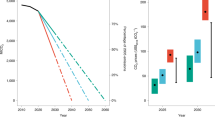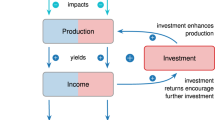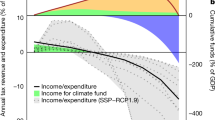Abstract
The current generation has to set mitigation policy under uncertainty about the economic consequences of climate change. This uncertainty governs both the level of damages for a given level of warming, and the steepness of the increase in damage per warming degree. Our model of climate and the economy is a stochastic version of a model employed in assessing the US Social Cost of Carbon (DICE). We compute the optimal carbon taxes and CO2 abatement levels that maximize welfare from economic consumption over time under different risk states. In accordance with recent developments in finance, we separate preferences about time and risk to improve the model’s calibration of welfare to observed market interest. We show that introducing the modern asset pricing framework doubles optimal abatement and carbon taxation. Uncertainty over the level of damages at a given temperature increase can result in a slight increase of optimal emissions as compared to using expected damages. In contrast, uncertainty governing the steepness of the damage increase in temperature results in a substantially higher level of optimal mitigation.
This is a preview of subscription content, access via your institution
Access options
Subscribe to this journal
Receive 12 print issues and online access
$209.00 per year
only $17.42 per issue
Buy this article
- Purchase on Springer Link
- Instant access to full article PDF
Prices may be subject to local taxes which are calculated during checkout

Similar content being viewed by others
References
Nordhaus, W. D. Managing the Global Commons: The Economics of the Greenhouse Effect (MIT Press, 1994).
Nordhaus, W. D. A Question of Balance: Economic Modeling of Global Warming (Yale Univ. Press, 2008).
Richels, R. G., Manne, A. S. & Wigley, T. M. Moving beyond concentrations: The challenge of limiting temperature change AEI-Brookings Joint Center for Regulatory Studies 04-11 (2004)
Hope, C. The marginal impact of CO2 from PAGE2002: An integrated assessment model incorporating the IPCC’s five reasons for concern. Integr. Assess. J. 6, 19–56 (2006).
Dietz, S. High impact, low probability? An empirical analysis of risk in the economics of climate change. Climatic Change 108, 519–541 (2009).
Anthoff, D., Tol, R. S. J. & Yohe, G. W. Risk aversion, time preference, and the social cost of carbon. Environ. Res. Lett. 4, 1–7 (2009).
Anthoff, D. & Tol, R. S. J. The impact of climate change on the balanced growth equivalent: An application of FUND. Environ. Res. Econom. 43, 351–367 (2009).
Interagency Working Group on Social Cost of Carbon, U. S. G. Technical Support Document: Social Cost of Carbon for Regulatory Impact Analysis Under Executive Order 12866 (Department of Energy, 2010)
Pycroft, J., Vergano, L., Hope, C. W., Paci, D. & Ciscar, J. C. A tale of tails: Uncertainty and the social cost of carbon dioxide. Econom. E-J. 5, 1–29 (2011).
Kopp, R. E., Golub, A., Keohane, N. O. & Onda, C. The influence of the specification of climate change damages on the social cost of carbon. Econom. E-J. 6, 1–40 (2012).
Kelly, D. L. & Kolstad, C. D. Bayesian learning, growth, and pollution. J. Econom. Dynam. Control 23, 491–518 (1999).
Keller, K., Bolker, B. M. & Bradford, D. F. Uncertain climate thresholds and optimal economic growth. J. Environ. Econom. Manage. 48, 723–741 (2004).
Leach, A. J. The climate change learning curve. J. Econom. Dynam. Control 31, 1728–1752 (2007).
Hanemann, M. in Climate Change Science and Policy (eds Schneider, S. H., Rosencranz, A., Mastrandrea, M. & Kuntz-Duriseti, K.) Ch. 17, 185–193 (Island Press, 2009).
Tol, R. S. The economic effects of climate change. J. Econom. Perspect. 23, 29–51 (2009).
Vissing-Joergensen, A. & Attanasio, O. P. Stock-market participation, intertemporal substitution, and risk-aversion. Am. Econom. Rev. 93, 383–391 (2003).
Bansal, R. & Yaron, A. Risks for the long run: A potential resolution of asset pricing puzzles. J. Finan. 59, 1481–509 (2004).
Bansal, R., Kiku, D. & Yaron, A. Long run risks, the macroeconomy, and asset prices. Am. Econom. Rev.: Papers Proc. 100, 542–546 (2010).
Chen, X., Favilukis, J. & Ludvigson, S. C. An estimation of economic models with recursive preferences. Quant. Econom. 4, 39–83 (2013).
Bansal, R., Kiku, D. & Yaron, A. An empirical evaluation of the long-run risks model for asset prices. Crit. Finance Rev. 1, 183–221 (2012).
Nakamura, E., Steinsson, J., Barro, R. & Ursua, J. Crises and recoveries in an empirical model of consumption disasters. Am. Econom. J.: Macroeconom. 5, 35–74 (2013).
Kreps, D. M. & Porteus, E. L. Temporal resolution of uncertainty and dynamic choice theory. Econometrica 46, 185–200 (1978).
Epstein, L. G. & Zin, S. E. Substitution, risk aversion, and the temporal behavior of consumption and asset returns: A theoretical framework. Econometrica 57, 937–969 (1989).
Traeger, C. P. Recent developments in the intertemporal modeling of uncertainty. ARRE 1, 261–285 (2009).
Gollier, C. Discounting an uncertain future. J. Public Econom. 85, 149–166 (2002).
Ha-Duong, M. & Treich, N. Risk aversion, intergenerational equity and climate change. Environ. Res. Econom. 28, 195–207 (2004).
Traeger, C. P. Why uncertainty matters—Discounting under intertemporal risk aversion and ambiguity. Econom. Theory (in the press, 2014)
Weil, P. Nonexpected utility in macroeconomics. Quart. J. Econom. 105, 29–42 (1990).
Epstein, L. G. & Zin, S. E. Substitution, risk aversion, and the temporal behavior of consumption and asset returns: An empirical analysis. J. Polit. Economy 99, 263–286 (1991).
Crost, B. & Traeger, C. P. Optimal climate policy: Uncertainty versus Monte-Carlo. Econom. Lett. 120, 552–558 (2013).
Nordhaus, W. D. A review of the Stern review on the economics of climate change. J. Econom. Literat. 45, 686–702 (2007).
Stern, N. (ed.) The Economics of Climate Change: The Stern Review (Cambridge Univ. Press, 2007).
Jensen, S. & Traeger, C. Growth uncertainty in the integrated assessment of climate change. Eur. Econom. Rev. (in the press, 2014)
Nordhaus, W. D. & Yang, Z. A regional dynamic general-equilibrium model of alternative climate-change strategies. Am. Econom. Rev. 86, 741–765 (1996).
Bosetti, V., Carraro, C., Galeotti, M., Massetti, E. & Tavoni, M. Witch: A world induced technical change hybrid model. Energy J. 27, 13–38 (2006).
Bauer, N., Baumstark, L. & Leimbach, M. The ReMIND-R model: The role of renewables in the low-carbon transformation—First best vs second-best worlds. Climatic Change 114, 145–168 (2012).
Broome, J. Counting the Cost of Global Warming (White Horse Press, 1992).
Asheim, G. Intergenerational equity. Annu. Rev. Econom. 2, 197–222 (2010).
Traeger, C. P. A 4-stated DICE: Quantitatively addressing uncertainty effects in climate change. Environ. Res. Econom. (in the press, 2014)
Meinshausen, M., Raper, S. & Wigley, T. Emulating coupled atmosphere–ocean and carbon cycle models with a simpler model, MAGICC6—part 1: Model description and calibration. Atmos. Chem. Phys. 11, 1417–1456 (2011).
Traeger, C. P. Intertemporal risk aversion. CUDARE Working Paper No. 1102 (2010)
Croce, M. M., Kung, H., Nguyen, T. T. & Schmid, L. Fiscal policies and asset prices. Rev. Financ. Stud. 25, 2635–2672 (2012).
McGrattan, E. R. & Prescott, E. C. Taxes, regulations, and the value of US and UK corporations. Rev. Econom. Stud. 72, 767–796 (2005).
Acknowledgements
We are grateful to L. Karp, S. Jensen, A. Butz, M. Hanemann, K. Smith, D. Lemoine, D. Farber and J. Harte, and for financial support by the Giannini Foundation.
Author information
Authors and Affiliations
Contributions
C.P.T. developed the research question and model and wrote the paper. Both authors together designed the algorithms and the graphical output; C.P.T. assisted and B.C. took the lead in programming and running the model.
Corresponding author
Ethics declarations
Competing interests
The authors declare no competing financial interests.
Supplementary information
Rights and permissions
About this article
Cite this article
Crost, B., Traeger, C. Optimal CO2 mitigation under damage risk valuation. Nature Clim Change 4, 631–636 (2014). https://doi.org/10.1038/nclimate2249
Received:
Accepted:
Published:
Issue Date:
DOI: https://doi.org/10.1038/nclimate2249
This article is cited by
-
Catastrophic Damages and the Optimal Carbon Tax Under Loss Aversion
Environmental and Resource Economics (2023)
-
A climate–economy model in a stochastic differential equilibrium with fractional Brownian motions and Poisson jumps
SN Business & Economics (2023)
-
Persistent inequality in economically optimal climate policies
Nature Communications (2021)
-
Integrated perspective on translating biophysical to economic impacts of climate change
Nature Climate Change (2021)
-
Carbon pricing under uncertainty
International Tax and Public Finance (2021)



